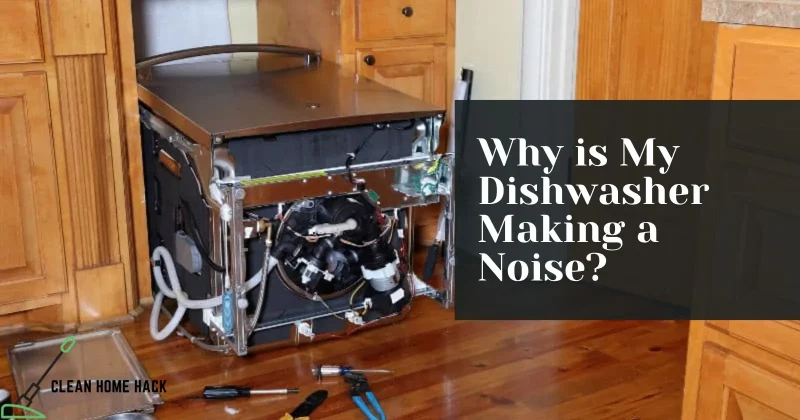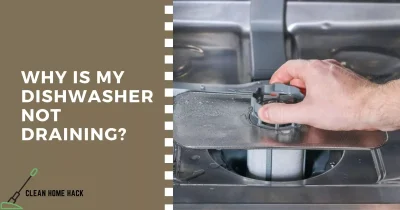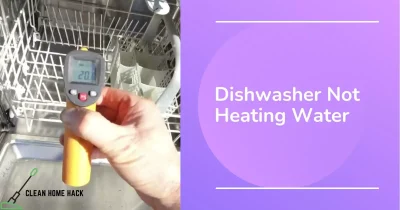Why is My Dishwasher Making a Noise?

 The Short Answer is: The Short Answer is: |
| If your dishwasher is making noise, it could be due to a variety of reasons. Some common causes of dishwasher noise include poorly stacked dishes, worn-out parts, food particles caught in the chopper blade, and problems with the wash pump or drain pump. |
Dishwashers are a convenient appliance that saves time and effort in the kitchen. However, if your dishwasher is making strange noises, it can be a cause for concern.
There are various reasons why your dishwasher might be making a noise, and identifying the source of the noise can help you determine if it’s a minor issue or a more significant problem.
In this article, we will explore the question, “Why is My Dishwasher Making a Noise?” the different types of noises that dishwashers make, and the reasons behind them. We will also provide some tips on what you can do to fix the issue or when to call a professional.
Table of Contents
Identifying the Types of Noises Your Dishwasher Makes
Dishwashers can make various noises, some of which are normal, while others may indicate a problem. Here are some of the most common types of noises your dishwasher may make and what they mean:
Normal sounds
- Hissing or sloshing sounds as water pumps through the inlet and jets.
- A gentle humming sound from the motor.
Abnormal sounds
- Thumping or knocking noises may be caused by the drain hose vibrating against nearby surfaces.
- Buzzing, droning, or scraping sounds may indicate an obstructed pump or damaged impeller.
- Clicking or grinding sounds may be heard when the dishwasher is changing cycles and are normal.
- Whining sounds from the wash pump motor are normal.
Other noises
- Beeping noises may indicate an error, and you should check the display panel for an error code.
- Grinding noises may be caused by foreign objects wedged inside the pump of the dishwasher.
If you hear any new or unusual sounds from your dishwasher, it is best to investigate the issue to prevent further damage. You can consult your user manual or call a professional technician to diagnose and fix the fault.
Possible Reasons for Noises During Dishwashing
1. Obstructed pump or damaged impeller: If an item becomes stuck in the pump assembly or the pump impeller is clogged or broken, it can cause a loud buzzing or grinding sound.
2. Fallen utensils: One of the most common causes of weird noises in dishwashers is fallen utensils. If a fork, spoon, or knife is knocked out of the utensil basket, it can make a rattling or clanking sound.
3. Food particles caught in the chopper blade: Grinding sounds are likely due to food particles caught in the chopper blade. Clearing the blade of any obstructions should solve the problem.
4. Unlevel the dishwasher: If your dishwasher is buzzing, it may not be level. Grab a level tool to check. If it’s not level, adjust the legs.
5. Faulty wash pump or drain pump: A new or very loud buzzing sound could be a sign that something’s wrong with the wash pump or drain pump. A broken or faulty wash pump can reduce water flow through your dishwasher, and you may notice that your dishes aren’t properly clean. Drain pump problems often prevent water from draining, so you might see pooled water at the bottom of the machine.
6. Diaphragm inside the valve: Over time, the diaphragm inside the valve can deteriorate and cause a high-pitched squealing or buzzing sound. If the valve is failing, it may also make a rattling or vibrating noise.
7. Thumping or banging during the wash cycle: If you hear a thumping or banging noise during the wash cycle, the dishwasher’s spray arm may be obstructed or damaged.
It’s important to determine when the noise is made, what type of noise it is, and whether the dishwasher’s performance is being affected to diagnose the issue. If the issue persists, it’s recommended to contact a professional for repair.
Investigating and Addressing Unusual Sounds
Dishwashers usually make hissing or sloshing sounds as the water pumps through the inlet and jets. A gentle humming sound from the motor is also nothing to worry about.
However, new or unusual sounds like thumping or grinding warrant investigation. The type of dishwasher noise you hear can help you figure out what the issue is.
Here are some steps to investigate and address unusual sounds when using a dishwasher:
1. Identify the type of sound: Different sounds indicate different issues. For example, a clicking or grinding sound in the control panel is normal for some dishwasher models, while a buzzing or squealing sound may indicate a faulty pump and motor assembly.
2. Check for vibrations: Sometimes, the dishwasher may vibrate against the surrounding wall or cabinets, causing annoying buzzing or thumping sounds. Try moving the dishwasher away from the wall or cabinets to see if the sounds stop. You could also fix the dishwasher wall or cabinets to prevent it from vibrating so loudly, or pad it with acoustic pads and blankets.
3. Clean the chopper blade: A rattling or grinding sound may indicate that the chopper blade is dirty or worn out. Clean the chopper blade or replace it if necessary.
4. Check the water inlet valve: A hissing or gurgling sound may indicate that the water inlet valve is clogged or malfunctioning. Check the valve and clean or replace it if necessary.
5. Call a professional: If you are unable to identify or fix the issue, it may be time to call a professional. They can diagnose the problem and recommend the best course of action.
Remember, regular maintenance and cleaning can help prevent unusual sounds from occurring in the first place. Refer to the dishwasher manual for specific instructions on how to clean and maintain your dishwasher.
Maintenance and Prevention of Dishwasher Noises
Dishwashers are a convenient appliance in any kitchen, but they can be noisy at times. Here are some tips to help maintain and prevent dishwasher noises:
1. Check the level of the dishwasher. If it’s not level, adjust the legs to make it level.
2. Move the dishwasher away from the surrounding wall or cabinets in case the sounds are due to vibrations.
3. Clean the dishwasher regularly to prevent clogs and buildup. Remove any food debris from the dishwasher and clean the filters.
4. Check the pump and motor assemblies if you hear a buzzing or squealing sound. Replace them if necessary.
5. Check the drain pump if you hear a loud buzzing sound. Replace it if necessary.
6. Check the impeller if you hear a scraping sound. It may have become dislodged or have a broken fin.
7. If you hear any new or unusual sounds like thumping or grinding, investigate the issue. The type of dishwasher noise you hear can help you figure out what the issue is.
By following these tips, you can help maintain your dishwasher and prevent any unnecessary noises.
When to Seek Professional Help for Dishwasher Noise
Dishwashers are designed to make some noise during operation, but certain sounds can indicate a problem that requires professional attention. Here are some signs that you should seek professional help for dishwasher noise:
1. Grinding or thumping sounds: These sounds can indicate a problem with the wash pump or drain pump. A broken or faulty wash pump can reduce water flow through your dishwasher, and you may notice that your dishes aren’t properly clean. Drain pump problems often prevent water from draining, so you might see pooled water at the bottom of the machine. If you hear these sounds, it’s best to call a professional technician to diagnose and fix the issue.
2. Loud buzzing sounds: A new or very loud buzzing sound could be a sign that something’s wrong with the wash pump or drain pump. If you hear this type of sound, it’s best to call a professional technician to diagnose and fix the issue.
3. Unusual sounds: New or unusual sounds like thumping or grinding warrant investigation. The type of dishwasher noise you hear can help you figure out what the issue is. If you’re unsure whether a sound is normal or not, it’s best to call a professional technician to diagnose the issue.
4. Persistent abnormal sounds: While some dishwasher noises can be resolved with simple troubleshooting, persistent abnormal sounds may require professional attention. If you’ve tried troubleshooting and the noise persists, it’s best to call a professional technician to diagnose and fix the issue.
5. DIY troubleshooting doesn’t work: If you’ve tried troubleshooting the issue yourself and the noise persists, it’s best to call a professional technician to diagnose and fix the issue.
In general, it’s best to seek professional help for dishwasher noise if you’re unsure whether a sound is normal or not, or if you’ve tried troubleshooting the issue yourself and the noise persists. Regular professional servicing can also help keep your dishwasher running smoothly and prevent issues from developing.
Frequently Asked Questions Related to the Topic:
How do I stop my dishwasher from making noise?
To stop your dishwasher from making noise, you need to identify the cause of the noise. Dishwashers can make various noises, including hissing, sloshing, humming, thumping, grinding, buzzing, droning, or scraping sounds.
Some common causes of dishwasher noise include obstructed or dirty drain or wash pumps, damaged impellers, worn-out bearings, and faulty inlet valves.
You can refer to your owner’s manual for the exact locations and instructions on how to fix the issue. If none of the above tips work, consider calling a professional technician to diagnose and fix the fault.
Why is my dishwasher making a strange noise?
If your dishwasher is making a strange noise, it could be a sign of a problem with the wash pump, drain pump, circulation pump, inlet valve, or pump intake.
Some noises are normal, such as hissing or sloshing sounds as the water pumps through the inlet and jets, or a gentle humming sound from the motor. However, new or unusual sounds like thumping, grinding, or beeping warrant investigation.
The type of dishwasher noise you hear can help you figure out what the issue is. If you are unsure about the cause of the noise, consider calling a professional technician to diagnose and fix the fault.
Why is my dishwasher making a loud buzzing sound?
A loud buzzing sound from your dishwasher could be a sign that something is wrong with the wash pump or drain pump. A broken or faulty wash pump can reduce water flow through your dishwasher, and you may notice that your dishes aren’t properly clean.
Drain pump problems often prevent water from draining, so you might see pooled water at the bottom of the machine. However, the most common cause of a buzzing noise coming from your dishwasher is that your dishes aren’t stacked properly.
When your dishes are not stacked properly, they can rub up against another dish in the dishwasher and cause a buzzing noise. To stop this from happening, make sure your dishes are stacked securely.
What are common dishwasher noises?
Dishwashers can make a variety of noises during operation, some of which are normal and some of which may indicate a problem. Normal sounds include hissing or sloshing sounds as water pumps through the inlet and jets, a gentle humming sound from the motor, and rattling caused by the dishes and utensils.
Abnormal sounds like thumping, grinding, buzzing, droning, or scraping warrant investigation. The most common causes of dishwasher noise are poorly stacked dishes, obstructed pump or damaged impeller, and failing water inlet valve.
Other causes include worn-out wash arm bearing, damaged circulation pump, broken chopper blade, and malfunctioning motor.
Conclusion on Why is My Dishwasher Making a Noise
In conclusion, a dishwasher can make various noises during operation, but some noises can indicate a problem. A gentle humming sound from the motor and hissing or sloshing sounds as the water pumps through the inlet and jets are normal.
However, new or unusual sounds like thumping, knocking, buzzing, grinding, popping, or crackling warrant investigation. The type of dishwasher noise you hear can help you figure out what the issue is.
Some potential causes of noise when water circulates in your dishwasher include a loose or misaligned pump, a foreign object stuck in the dishwasher, a broken or dislodged impeller, or parts becoming loose due to normal movement. If you hear any unusual noises, it is best to investigate the issue to prevent further damage to your dishwasher.







